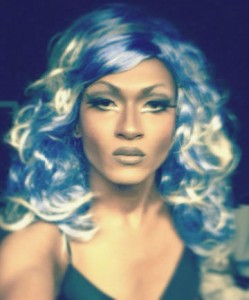Maldivians seeking asylum abroad on grounds of religion or sexuality can be assured of prosecution should they return, says the President’s Office.
“The threat from the state they speak of is in actuality our law and regulations. That will not change,” President’s Office Spokesman Ibrahim Muaz explained.
Muaz’s comments come in response to a story in the New Zealand media that a homosexual Maldivian asylum seeker has become an prize-winning drag queen in Wellington.
Abraham Naim told the Dominion Post that he had been granted asylum in 2013 after facing persecution in the Maldives.
The article quotes New Zealand’s Ministry of Business, Innovation, and Employment as stating that Naim was “at risk of serious harm from state agents” and that “there is a real chance of persecution if he returned to the Maldives”.
Naim also told the news website that he has been prey to numerous online threats and hate mail. “My entire existence is controversial,” he said.
 Asked to comment on the matter today, Mushrif Musaid (Supervisor) at Ministry of Islamic Affairs Jannath Saeed stated that acts of homosexuality are clearly anti-Islamic and against the country’s laws, and thereby subject to legal action.
Asked to comment on the matter today, Mushrif Musaid (Supervisor) at Ministry of Islamic Affairs Jannath Saeed stated that acts of homosexuality are clearly anti-Islamic and against the country’s laws, and thereby subject to legal action.
“Such acts of homosexuality are haraam in Islam. However, this ministry has not so far received any complaints from anyone claiming to be a persecuted homosexual,” said Jannath.
“We will need to check if the ministry has issued any threats or statements against a homosexual. The fact remains that such an act is without doubt against Islam,” he commented.
Ministry of Foreign Affairs Media Official Zaaid Ahmed stated that he would comment on the matter on a future date after consulting with the relevant officials in the ministry.
Speaking on the issue of Maldivian asylum seekers last month, President Abdulla Yameen referred to the act of leaving the Maldives as “treason”, though he suggested those who returned would be welcomed.
“If they want to leave the shelter of Maldives, we say, you are welcome, go somewhere else. But if they want to come back to the Maldives, we will again say, welcome back to the Maldives,” said the president.
“Too much to lose”
Spokesman Muaz told Minivan News today that instances of Maldivian youth committing criminal acts under the protection of foreign states had been seen before.
“No one can get away with committing such acts for as long as they are using a Maldivian identity card or passport,” he added.
In his interview with the Dominion Post, Naim – who performs under the name Medulla Oblongata – explained that he had been disowned by his father.
“I’m definitely in a better place now,” he told the paper.
Speaking with other Maldivians currently living abroad for reasons related to their sexuality, Minivan News was told that most preferred to refrain from publicly revealing their sexuality as there was “too much to lose”.
Some said it would be difficult to get employment, while others spoke of being ostracised from society, fearing the repercussion their families might face.
“I prefer to stay quiet about it in my country of origin and instead live elsewhere where I can live comfortably with my sexuality. I’d lose everything from my family connections to friends if I come out,” said 23-year-old Ahmed Matheen*.
Moosa Farih* suggested that the situation for gay Maldivians had deteriorated in recent times.
“Until now, Maldivian LGBT have been largely left alone, but I feel that the focus has gradually been shifting onto us lately, and this is because there is increasing number of people who are trying hard to create the platform for our voices to be heard.”
“I am glad that Naim is out there spearheading this change. In Islam, there is no compulsion in religion, but that is never practiced. If the government and the people of Maldives wanted LGBT to be out of their system, asylum seekers shouldn’t be threatened with extradition and prosecution,” said Farih.
One 28-year-old Maldivian man, still living in n the capital Malé said that only a few “trusted persons” were aware of his sexuality.
“I could easily seek asylum elsewhere, but the point is, my life does not revolve around my sexuality,” he said.
“Yes, I am homosexual. But that is just an unavoidable fact like the colour of my eyes or my skin tone.
I’d rather keep it secret and live here and achieve my dreams of working to make this country a better, more progressive place,” he said, on account of anonymity.
*Names changed on request